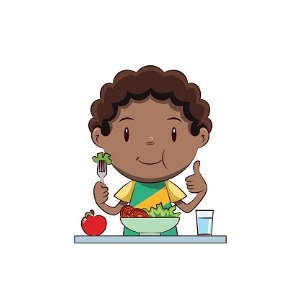
Besides obesity, unhealthy eating puts your child at risk for a whole host of lifestyle-related diseases; diabetes and heart conditions to name a few.
A family health kick
We know that most kids are fussy and want their sweet treats, and will turn up their noses at anything remotely healthy. It’s worth looking at your family’s nutrition dynamics.
• Do you sit down together as a family to eat?
• Does your child understand the basics of eating healthy, and what makes food healthy?
• Does he enjoy fruit and vegetables?
• At the shops, does he immediately ask for chips and chocolates?
Start with the basics
Children are exposed to lots of attractive media messaging about the unhealthier food options like burgers and pizzas, and they respond accordingly. Expose them to different foods and explain the health benefits. Do this through reading or browsing the different grocery aisles.
Lead by example
Do you model good eating habits? Do you label foods and “good” or “bad”? Your kids may be picking up on your sentiments. Rather point out how the food impacts on the things your child cares about. For instance, tell your soccer player son that the protein in the chicken helps build strong muscles.
Don’t nag about your child’s choices
Instead, make sure that the food you buy and serve at home and in lunchboxes is healthy. Provide healthier options for not-so-healthy favourites (like oven-roasted potato wedges instead of fried chips).
Don't use food as a reward
We do it all the time, “reward” ourselves for sticking to a diet with a chocolate. Or talk about “cheat” days. Again, children pick up on these ideas and unconsciously start to affect them too. Make an effort to give kids some control over what they eat. Get them involved in shopping. When preparing meals, give them choices between two healthy alternatives, for instance, carrots or peas, apples or pears and be sure to praise their healthy food choices.
Watch portion size
If you continually serve vast portions at home (and insist your child finish his plate!), he’s going to expect this quantity of food all the time – and take that habit with him as he grows up. A study by the Children’s Nutrition Research Centre in America found that when children were served a larger-than-average portion, they took in more calories, ate bigger bites than normal – but when allowed to serve themselves – they chose smaller portions.
Fast and healthy is possible
It’s not ideal, but sometimes kids just want a burger, fries and milkshake. As long as it isn’t eaten too often, fast food can be an enjoyable treat. Don’t supersize the meal and where possible, choose the salad over fries. At the same time, encourage your child to choose water instead of the milkshake.





 Publications
Publications
 Partners
Partners














